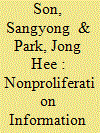| Srl | Item |
| 1 |
ID:
186807


|
|
|
|
|
| Summary/Abstract |
Although only 23 people on average have been killed per year by terrorist attacks in the United States since 2001, American citizens and politicians consistently rank terrorism as a top security threat, leading to costly wars abroad and the repression of civil liberties at home. To what extent can education about terrorism alter perceptions of the threat? Much existing scholarship—and consistent polling over the past two decades—suggests that it cannot, but we disagree. Evidence gathered from an extensive series of experimental and observational surveys involving students in 31 terrorism and non-terrorism related courses at 12 universities—including massive open online courses (MOOC) and online surveys—reveals that the more individuals learn about terrorism, the smaller they perceive the threat to be to themselves and to the U.S. In the fight against terrorism and the fear it inspires, knowing really is half the battle.
|
|
|
|
|
|
|
|
|
|
|
|
|
|
|
|
| 2 |
ID:
193104


|
|
|
|
|
| Summary/Abstract |
What explains the foreign policy gap between elites and the general public on nuclear proliferation? We investigate specific contexts in which experts’ nonproliferation information changes public attitudes toward nuclear weapons development using a novel attitude change experiment. By randomly assigning seven categories of nonproliferation information to pro-armament survey participants, we examine how different types of nonproliferation information affect pro-armament respondents’ opinions and behavioral choices. The results of our experiment demonstrate the enlightening effect of economic sanctions information. After learning about the economic costs and consequences of nuclear weapons development, pro-armament respondents substantially changed their opinion as well as behaviors toward nuclear proliferation. In comparison to economic sanctions information, other types of nonproliferation information (e.g. conditional military punishment, normative sanctions, nuclear technology sanctions, elite or public opposition to proliferation) have limited effects on pro-armament subjects’ attitude changes. These findings are the first to identify the relative explanatory powers of previous explanations for nuclear nonproliferation at the individual level.
|
|
|
|
|
|
|
|
|
|
|
|
|
|
|
|
| 3 |
ID:
031177


|
|
|
|
|
| Publication |
New York, Academic Press, 1968.
|
| Description |
xvi, 407p.
|
| Series |
Social psychology a series of monographs, treatises and texts
|
|
|
|
|
|
|
|
|
|
|
|
Copies: C:1/I:0,R:0,Q:0
Circulation
| Accession# | Call# | Current Location | Status | Policy | Location |
| 002687 | 300/GRE 002687 | Main | On Shelf | General | |
|
|
|
|
| 4 |
ID:
132670


|
|
|
|
|
| Publication |
2014.
|
| Summary/Abstract |
The nuclear accident in Fukushima and the subsequent discussions about nuclear power influenced public acceptance of this technology. The aim of the present study was to examine why after the Fukushima accident some people converted from supporting nuclear power to opposing it or became undecided. Data from a longitudinal telephone survey with two measurement points were used. The first survey was conducted about 15 months before the accident in Fukushima and the second survey was conducted about 20 months after. The sample consisted of 561 respondents from the German- and French-speaking regions of Switzerland. Results suggest that changes in benefits perception were mainly responsible for people×s changes in attitude toward nuclear power. People perceived somewhat more risks related to nuclear power after the accident in Fukushima. This change in risk perception did not explain the attitudinal changes of proponents into opponents of nuclear power, however.
|
|
|
|
|
|
|
|
|
|
|
|
|
|
|
|